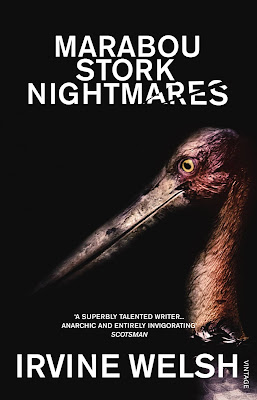Book #54
Roy Strang is engaged in a strange quest in a surrealist South Africa. His mission is to eradicate an evil predator-scavenger bird, the marabou stork, before it drives away the peace-loving flamingo from the picturesque Lake Torto.But behind this world lies another: the world of Roy's bizarre family, the Scottish housing scheme in which he grew up, his mundane job, a disastrous emigration to Africa, and his youthful life of brutality with a gang of soccer casuals. As one world crashes into the other, this potentially charming story of ornithological goodwill mutates into a filthy tale of violence, abuse and redemption.
Some books are just perfect for reading over and over again, and any offering from Welsh is worth another punt. The last time I read this was back in 2010, and with the benefit of growing older, I felt I was more deeply embroiled and much further appalled this time than I remember being at the shy age of 23.
Roy is traversing the plains of Africa in a maddening search for the Marabou stork. He’s hellbent on killing the thing, for dubious reasons, and we join him and his pal Sandy in their exploration. All too soon, we’re ejected from Roy’s killing adventure into what seems to be a hospital room. He isn’t in Africa - he’s in a comatose state in a hospital somewhere in Edinburgh, and a cooing nurse is attempting to take his temperature.
Throughout the course of the novel, we journey through three levels of consciousness with Roy, all frightening, all enlightening, and all utterly harrowing. He describes these levels as an incredibly deep well, which he’s climbing both up and down. At times Roy is at the top edge of the well, almost on the brink of waking up; he can hear nurses talking to him, his ma and dad in the room squabbling or playing tapes of both of them singing in an attempt to trigger something in his brain. Slightly further down the well, we focus on Roy’s memories, his life, his mistakes, his regrets. And even further down than this, almost at the bottom, we’re within Roy’s deepest level of unconsciousness, the fantasies of Africa, providing dark metaphor and commentary on both Roy’s memories and current situation.
These levels are an impressive technique, and really depict a feeling of drifting in and out of different situations in our heads as Roy drifts in and out of his awareness of reality. Each of the levels work together to build a fuller picture of Roy - who he is, why he’s there, what he’s done, why he’s battling against waking up. It all comes out slowly, exasperatingly, as though he’s ashamed to tell.
As always, there’s no one to like here, no good characters. All flawed, all dark, all struggling to reach for something, but always real folk you’d meet on the street. They are perfectly characterised, accurately depicted, and their trials are as relatable and heartbreaking as they are in reality.
Welsh always gives us lots of darkness balanced in with loads of black humour and brilliant moments, and although we’re used to it, there’s something just a tiny bit darker about the old Marabou stork than I’ve seen anywhere else.

